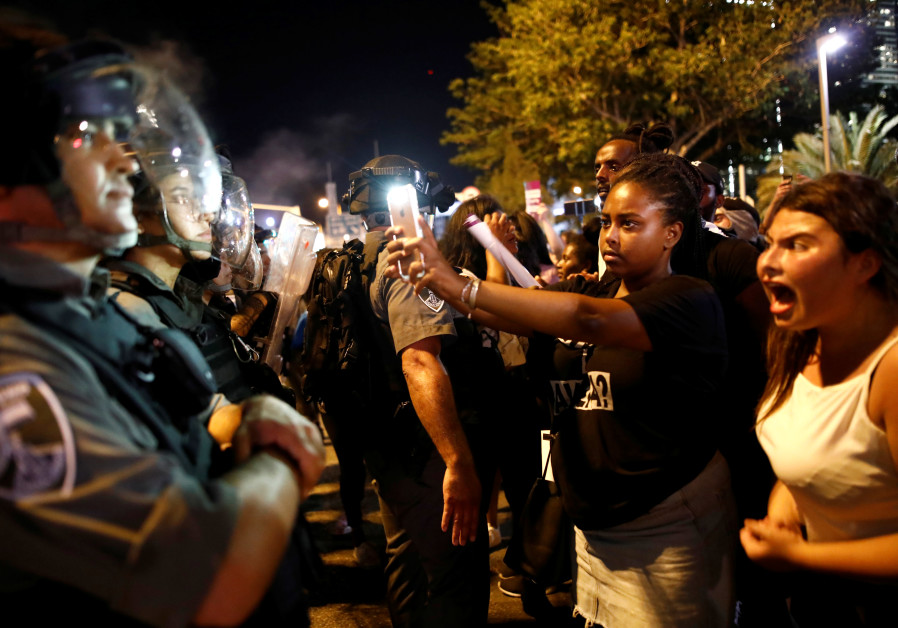 HEALING ETHIOPIAN ANGER
HEALING ETHIOPIAN ANGER
JPOST EDITORIAL
Israeli leaders and society in general understand that there are problems of racism that we must address, and also help heal the anger among victims in the Ethiopian-Israeli community.

Protests erupted across Israel this week by Israelis from the Ethiopian community. Demonstrators blocked intersections. Some of the protests descended into tragic clashes with police in which more than 60 protesters were arrested and 47 officers injured. There are fears the protests will continue. Now is the time to reach out and heal the wounds and embrace each other.
These are not the scenes anyone in Israel wants to see, either members of the Ethiopian-Israeli community who have suffered racism in the past, or police and others caught in the traffic jams that surrounded the protests. The protests were triggered by the shooting of 19-year old Solomon Tekah in a suburb of Haifa. He was killed after an altercation with an off-duty policeman, the circumstances of which are under investigation.
The wider context, and the reason that people poured into the streets in anger, is that four years after similar nation-wide anti-racism protests in April 2015, there is a feeling among many Ethiopian-Israelis that the systemic issues youth face are still not being addressed. In April 2015, an Israeli soldier named Damas Pakedeh was stopped by police while riding his bicycle. An altercation ensued. At the time, the highest levels of government, from the president to the prime minister, sought to reach out to Pakedeh and the community and assure them that the incident was not consistent with the values of the Israel Police, and that they wanted a society in which people are not accosted for the color of their skin.
In the wake of the 2015 protests, the government sought wide-ranging changes to how addresses issues of racism and integration of Ethiopian-Israelis. This involved discussions about juvenile incarceration, meetings with the police, providing tools for people to report racism, and making local authorities more responsive. For instance, studies found that Ethiopian-Israeli youth offenders were three times more likely to receive prison time.
Israeli leaders and society in general understand that there are problems of racism that we must address, and also help heal the anger among victims in the Ethiopian-Israeli community. President Reuven Rivlin said we must stop and think how to continue. “Let us sit together in peace.” Articles in the media said it is important that the government addresses anger over discrimination by police. An officer should think twice before pulling his or her weapon.
The tragedy of the violence in Tuesday’s protests and the protests that began again on Wednesday, is that there is a risk of a rift in Israeli society. While there is sympathy for Ethiopian Jews, no one wants to see violence. This isn’t the first time we have seen violence from different sectors of society, whether they were clashes with some extremists on the far right, or with ultra-Orthodox protesters. In general, Israeli society is more cohesive today than in the past. But there is much work still to be done.
With every clash between protesters and police, the divide will widen between young Ethiopian-Israelis, who feel harassed and profiled by the authorities, and the police who interact with black youth. This creates a toxic mix that is the opposite of what must happen. Ethiopian-Israelis are a shining example of the wonderful diversity and beauty of Israeli society.
Many serve with distinction in the IDF and throughout society, including recent appointments of the first Ethiopian-Israeli judges, and success in the diplomatic corps, arts and academia. That is what Israel is all about. If we forget that on the streets of our cities, then we truly fail.
Zawartość publikowanych artykułów i materiałów nie reprezentuje poglądów ani opinii Reunion’68,
ani też webmastera Blogu Reunion’68, chyba ze jest to wyraźnie zaznaczone.
Twoje uwagi, linki, własne artykuły lub wiadomości prześlij na adres:
webmaster@reunion68.com
